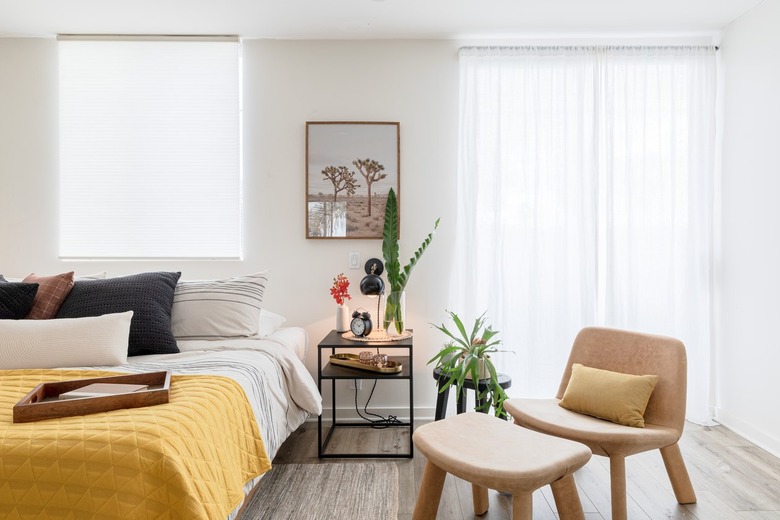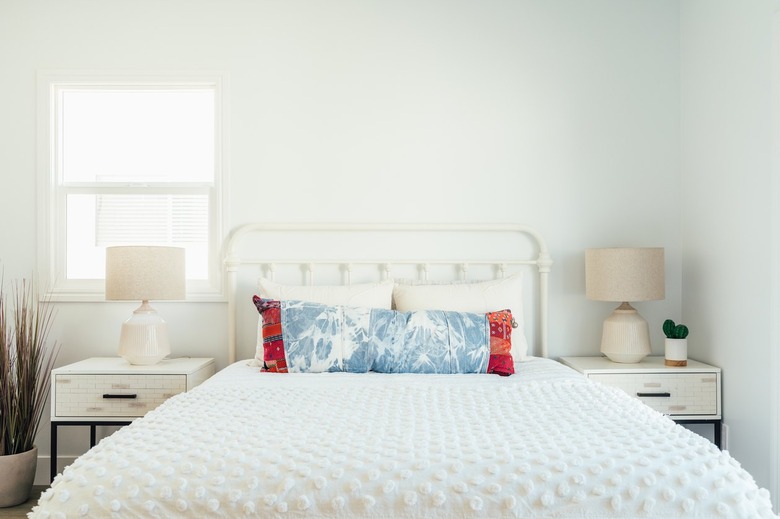6 Electronics-Related Habits That Are Ruining Your Sleep
The start of a new year is a great time to reevaluate bad habits and routines to make positive adjustments in your life. New Year's resolutions can be daunting if you get too lofty, but smaller changes are a great place to start. Like taking steps to improve your sleep!
Understanding how your electronics can negatively impact your sleep is crucial to boosting the quality of your rest, so we went straight to the source, consulting sleep experts from WebMD, The Sleep Doctor, New York University, the online sleep service Sleepstation, and the non-profit organization Sleep Foundation. Read on for a roundup of bedtime bad habits — and how to combat them to rest easier this year.
1. Looking at screens within two hours of sleeping.
1. Looking at screens within two hours of sleeping.
The repercussions of engaging with screens right before bed have long dominated the discourse around electronics and sleep — and each of the sleep pros we talked to reiterated these sentiments.
"Studies have shown that blue light emitted by screens has an effect by suppressing the release of melatonin, one of the essential messengers in the initiation of sleep," Dr. Neil Stanley, the director of sleep science at Sleepstation, tells Hunker.
Melatonin is the all-important sleep hormone that regulates our circadian rhythms, making it a critical ingredient for a good night's sleep.
"People who use screens in the hours before [sleep] have been shown to have poorer sleep and [they] feel sleepier the next day," says Dr. Stanley. "Thus, it is best to avoid using technology such as your smartphone, iPad, TV, and laptop before your intended hour of retiring; the science suggests that this should be for at least two hours before bed, but anything is better than nothing."
Chief Medical Officer at WebMD, Dr. John Whyte, agrees.
"The simple fact is that you should be preparing the mind for sleep, not reading/answering emails, 'talking' to your imaginary friends on social media or watching funny cat videos," says Dr. Whyte.
2. Exposing yourself to too much light before bedtime.
2. Exposing yourself to too much light before bedtime.
Too much light of any kind can negatively affect the quality of your snooze. The American Academy of Sleep Medicine has a list of healthy sleep habits where it advises sleepers to "limit exposure to bright light in the evenings." In addition, a sleep researcher at Harvard, Stephen Lockley, has found that most table lamps can impair your sleeping.
"Any light immediately before bed is not conducive to good sleep," adds Dr. Stanley. This includes non-blue light, too. "Recent research has shown that even with blue light stripped out, there is still a suppression of melatonin production." So even the use of "paper white" devices like eReaders before bed has been shown to disrupt sleep.
That said, Dr. Michael Breus, a.k.a. The Sleep Doctor, says that these types of light are still less harmful than blue light. He recommends using blue light blocking glasses for your pre-sleep media consumption. Meanwhile, scientists at Harvard Health Publishing suggest using dim red lights for night lights, since red light is less likely to suppress melatonin.
3. Keeping your phone on your nightstand or bedside table while sleeping.
3. Keeping your phone on your nightstand or bedside table while sleeping.
Having your phone at arm's reach from your bed is a dangerous game and can perpetuate bad sleep habits. Try putting your phone in another room or farther away from your bed to limit your habitual use right before you hit the hay.
"People tend to use their phones right before they go to sleep so instead of quieting their mind, they are actually revving it up," says Dr. Whyte. He also cautions that another pitfall of keeping your phone too close to your bed is getting awoken by its dings, chimes, and buzzes during the night. If you're feeling ambitious, aim for a technology-free bedroom to achieve the best sleep you can.
4. Losing track of time while on your devices at night.
4. Losing track of time while on your devices at night.
Dr. Breus tells us that the most common bad habit he sees people fall into when it comes to using their electronics before bed is not realizing how much time they are spending on their device. "The whole 'look up and it's 1 am' situation is one of the most common and most damaging. Lots of people miss bedtimes," he says.
Find an accountability buddy to remind you when to stop using your device. Or, set an alarm on your phone to go off after you've been on it for 20 minutes.
5. Having an emotional text conversation right before sleeping.
5. Having an emotional text conversation right before sleeping.
While the blue light emitted from cell phones is of course an issue when achieving high-quality sleep, there are other factors at play with our phone activity that can be even more detrimental to having a restful night.
"It is more about engagement than light exposure," Dr. Breus explains. "If you are having an even slightly emotional conversation with someone it can affect your ability to fall or stay asleep, based on the conversation (good or bad news)."
These mental strains can not only cause poor sleep, but also result in poor sleep. Last year, doctors at NYU's Department of Population Health within the Langone Health center conducted an analysis of the relationship between sleep duration and emotional distress, and found a significant correlation between the two. That intense conversation with a friend or late-night stalking of an ex's Instagram can hamper your sleeping, which perpetuates even more distress the next day.
Consider another activity to wind down before bed, like meditation or yoga.
6. Not having your devices set to nighttime mode.
6. Not having your devices set to nighttime mode.
While divesting from your devices altogether at night is optimal, we know that's not realistic or possible sometimes, for various reasons. At the very least, the Sleep Foundation encourages setting cell phones, tablets, and computers to nighttime mode.
"The most effective nighttime modes reduce blue light emissions and decrease the display's brightness setting," the foundation explains on its site. "You should manually dim the display if your device does not automatically adjust the brightness in nighttime mode."
Here's to better sleep!

